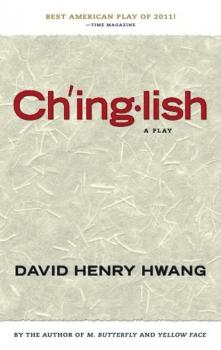David Henry Hwang
Список книг автора David Henry HwangGolden Child
• David Henry Hwang is the leading Asian-American playwright • Broadway opening April 1998 • Has been developed at numerous theatres around the country • His first Broadway production since M. Butterfly • Produced originally at the Public Theatre in NYC>
Chinglish (TCG Edition)
Acclaimed playwright David Henry Hwang’s hilarious comedy Chinglish has been described as “a sly, funny, multi-tiered joke with a laugh-out-loud surface that conceals a movingly somber aftertaste” (Village Voice) and “a triumph in any language” (New York Magazine).Springing from the author's personal experiences in China, Chinglish follows a Midwestern American businessman desperately seeking to score a lucrative contact for his family's firm as he travels to China, only to discover how much he doesn't understand. Named for the unique and often comical third language that evolves from attempts to translate Chinese signs into English, Chinglish explores the challenges of doing business in a country whose language—and underlying cultural assumptions—are worlds apart from our own. David Henry Hwang's «best new work since M. Butterfly, this shrewd, timely and razor-sharp comedy» (Chicago Tribune) received its Broadway premiere in fall 2011, and a film adaptation is currently in development.David Henry Hwang is the author of the Tony Award-winning M. Butterfly, Yellow Face (OBIE Award, 2008 Pulitzer Prize finalist), Golden Child (1997 OBIE Award), FOB (1981 OBIE Award), Family Devotions (Drama Desk nomination), and the books for musicals Aida ( co-author), Flower Drum Song (2002 Broadway revival), and Tarzan, among other works. David Henry Hwang graduated from Stanford University, attended the Yale School of Drama, and holds honorary degrees from Columbia College in Chicago and The American Conservatory Theatre. He lives in New York City with his wife, actress Kathryn Layng, and their children, Noah David and Eva Veanne.
Yellow Face (TCG Edition)
•Successful Productions at the Center Theatre Group, LA, and the Public Theatre, NY. •Finalists for 2008 Pulitzer Prize in Drama •Published in American Theatre Magazine
Trying to Find Chinatown
David Henry Hwang has the potential to become the first important dramatist of American public life since Arthur Miller, and maybe the best of them all. -Detroit NewsDavid Henry Hwang has created an extraordinary body of work over the last twenty years: the Tony Award-winning play, M. Butterfly; the OBIE Award-winning and 1998 Tony nominated Golden Child; the libretti to The Voyage (included here) and 1000 Airplanes on the Roof (both for composer Philip Glass); and the book to Aida, which he coauthored. He has received fellowships from the Rockefeller and Guggenheim foundations, the National Endowment for the Arts, the New York State Council on the Arts and The Pew /TCG National Artists Residency Program.This eight-play collection includes:FOB: «fresh off the boat» explores the conflicts between old and new worldsThe Dance and the Railroad: a haunting play about the inhuman conditions of railroad workers in the 1860s American WestFamily Devotions: a biting work which probes the religious conflicts in a modern Chinese-American familyThe Sound of a Voice: a meditation on the traditional roles of man and woman set in feudal JapanThe House of Sleeping Beauties: a reworking of a novella by Yasunari KawabataThe Voyage: the libretto to the opera by Philip Glass, which examines Columbus's arrival in AmericaBondage: a one-act set in an S&M parlor, which examines racial stereotypes and sexual mythsTrying to Find Chinatown: a two-person play, in which two Asian-American men-one searching for his Asian heritage, the other trying to shake himself free-meet by chance in New York City"David Henry Hwang knows America-its vernacular, its social landscape, its theatrical traditions. He knows the same about China. In his plays, he manages to mix both of these conflicting cultures until he arrives at a style that is wholly his own. Hwang's works have the verve of the well-made American stage comedies and yet, with little warning, they bubble over into the mystical rituals of Asian stagecraft. By at once bringing West and East into conflict and unity, this playwright has found the perfect




